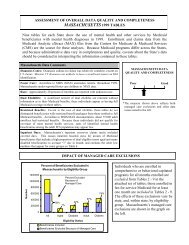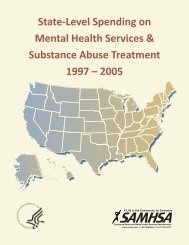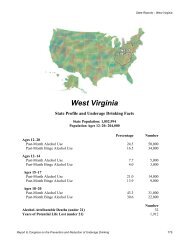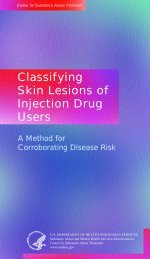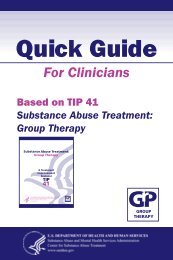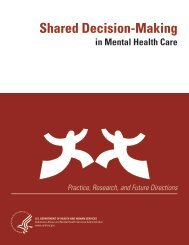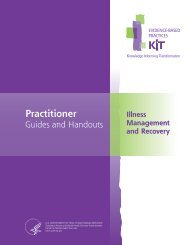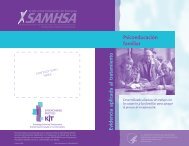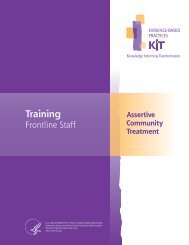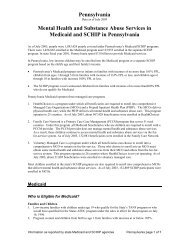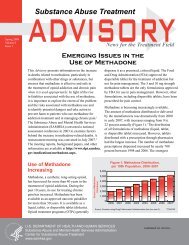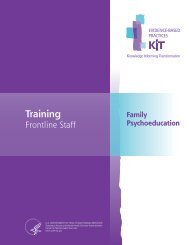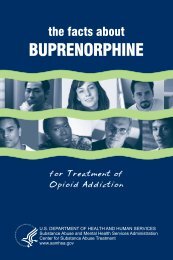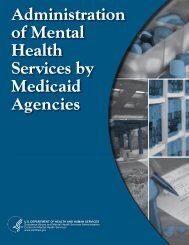TAP 21 - SAMHSA Store - Substance Abuse and Mental Health ...
TAP 21 - SAMHSA Store - Substance Abuse and Mental Health ...
TAP 21 - SAMHSA Store - Substance Abuse and Mental Health ...
You also want an ePaper? Increase the reach of your titles
YUMPU automatically turns print PDFs into web optimized ePapers that Google loves.
PD IV. Service Coordination<br />
Competency 68:<br />
Underst<strong>and</strong> <strong>and</strong> recognize stages of change <strong>and</strong> other signs of treatment<br />
progress.<br />
Knowledge<br />
XX How to recognize incremental progress<br />
toward treatment goals.<br />
uX The client’s cultural norms, biases,<br />
unique characteristics, <strong>and</strong> preferences<br />
for treatment.<br />
uX Generally accepted treatment outcome<br />
measures.<br />
uX Methods for evaluating treatment<br />
progress.<br />
uX Methods for assessing the client’s<br />
motivation <strong>and</strong> adherence to treatment<br />
plans.<br />
uX Theories <strong>and</strong> principles of the stages of<br />
change <strong>and</strong> recovery.<br />
Skills<br />
uX Identifying <strong>and</strong> documenting change.<br />
u Assessing adherence to treatment plans.<br />
u Applying treatment outcome measures.<br />
u Communicating with people of other<br />
cultures.<br />
u Reinforcing positive change.<br />
Attitudes<br />
uX Appreciation for cultural issues that affect<br />
treatment progress.<br />
u Respect for individual differences <strong>and</strong><br />
readiness to change.<br />
u Recognition of the importance of<br />
continued support, encouragement,<br />
<strong>and</strong> optimism.<br />
Uses of The Competencies<br />
The Competencies has been used as a resource by instructors in developing online courses for<br />
Access ED, in presenting the Mid-Atlantic ATTC’s Center for Online Courses, <strong>and</strong> for traditional<br />
classroom delivery tailored to counselors, case managers, <strong>and</strong> supervisors. In Virginia specifically,<br />
The Competencies guided the design of the Virginia Institute for Professional Addictions Counselor<br />
Training (VIPACT) curriculum, which provides the didactic hours required for the Virginia Certified<br />
<strong>Substance</strong> <strong>Abuse</strong> Counselor credential. This program has been delivered to nondegreed, as well as<br />
B.S.- <strong>and</strong> M.S.-prepared, counselors <strong>and</strong> case managers over the past 3 years. VIPACT was developed<br />
<strong>and</strong> continues to be delivered under a cooperative agreement between the Mid-Atlantic ATTC <strong>and</strong><br />
the Virginia Department of <strong>Mental</strong> <strong>Health</strong>, <strong>Mental</strong> Retardation <strong>and</strong> <strong>Substance</strong> <strong>Abuse</strong> Services.<br />
91



